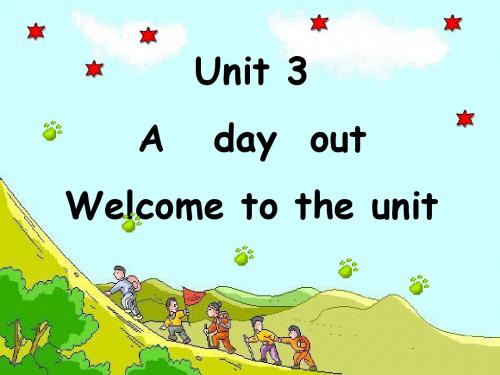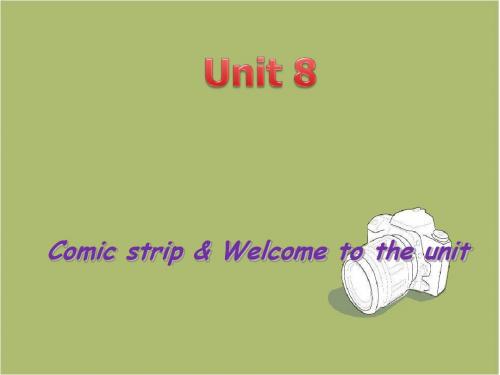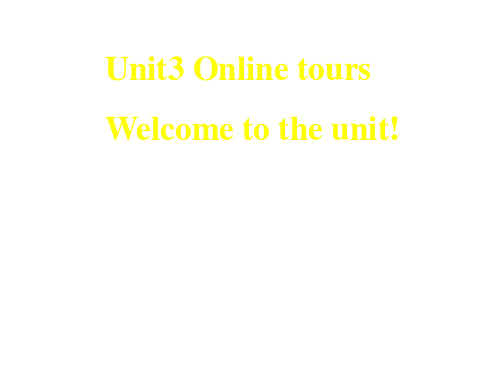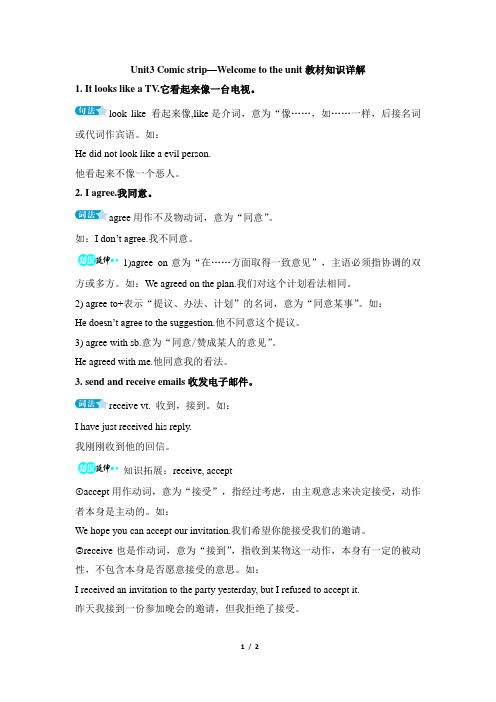新版牛津译林英语八年级下册8BUnit3Welcome to the unit
牛津译林版8A Unit3 A day out Welcome to the unit课件(共24张PPT)

Leo
Question: Where did Leo write the postcard?
in a little coffee shop by the River Seine. Where is he going ?
to the top of the Eiffel Tower
Jane
President The __________of the USA lives in the White House—a beautiful with building ______a big garden and many trees.
Which building are they talking about?
The Golden Gate Bridge It is in San Franciso, the USA.
Match each building with its city and country • the White House
• the Great Wall • the Big Ben
Francisco
Paris London Beijing Sydney Washington
China
France Britain America
• the Harbour Bridge
• the Golden Gate Bridge • the Eiffel Tower
Australia
Fast reading:
Unit 3
A
day out
Welcome to the unit
If you are free, what are you going to do?
If Eddie is free, what do you think he is going to do?
牛津译林版江苏地区英语八年级下册全套备课:8B Unit 31 (Welcome to the unit)

Online travel
Welcome to the unit
Unit 3 Online travel
Last summer vacation,I flew to Dalian,and took some photos like the left one.I spent 7 days there.It cost me more than RMB 10000.
Practice: What do you use your computer for? What do you use your computer to do?
I usually use it to record my own songs. I think it is really fun and I can enjoy myself. I use my computer to do so every sunday.
Last night, I got some photos of Disney Land.I spent less than 1 second. They cost me nothing.
How can I get the photos? Do you know?
The world in computers.
What does it look like? Is it turned on now?
remote control Is it a remote control? No, it is a mouse
Answer the questions: 1. Have Hobo and Eddie ever seen a computer?
What do you usually use your computer for? Why do you do that ? How often do you use it to do so?
初中英语 牛津译林版八年级下册Unit3单元重点短语及核心句型

牛津译林版八年级下册Unit3单元重点短语及核心句型课时1 Comic strip & Welcome to the unit重点短语名词短语1.online tours 网上旅行动词短语2.change the channel 换频道3.do word processing 做文字处理4.search for information 搜索信息5.send and receive emails 发送和接收电子邮件6.watch videos 看视频e sth.for sth./use sth.to do sth.用某物做某事8.be fast and easy 又快又容易核心句型1.It looks like a TV.它就像电视机。
2.-What do you usually use your computer for?你通常用你的电脑来做什么?-I usually use it to search for information.我通常用它来搜索信息。
3.-How often do you use your computer for this?你多长时间用电脑搜索一次信息?-Almost every day.几乎每一天。
课时2 Reading重点短语名词短语1.a tour guide 导游2.the world-famous trade centre举世闻名的贸易中心3.international banks 国际银行4.tickets to different places 去不同地方的票动词短语5.welcome to"Around the World in Eight Hours”欢迎来到“八小时环游世界”6.click on sth. 点击某物7.gather there to welcome the new year聚在那里迎接新年8.fall from the sky从天上掉下来9.be famous for...以······而著名其他10.at the top of the page 在页面的顶部11. at the southern end of...在······的最南端12.further on 再向前13. on New Year's Eve 在新年前夕14. in the centre of the island 在岛的中央15. since the early twentieth century 自从20世纪早期起16. so much for sth.(表示就某事讲完了)关于某事就讲这么多,某事到此为止17. at the bottom of the page 在页面的底部核心句型1.Just click on it, and you can visit Asia, Africa, Europe, America and more in only eight hours.只要点击它,你就能在仅仅八小时内访问亚洲、非洲、欧洲、美洲,还有更多的地方。
Unit+3+Period+1++Welcome+to+the+unit 牛津译林版英语八年级下册+

D. looks like
4. There is something wrong with my computer. I can see nothing
on the ___C____.
A. keyboard B. mouse
C. screen D. main unit
5. —____D_____ you _________ Linda's invitation to her birthday
译林版 初中英语 译林版八年级下册
Unit 3 Period 1 Welcome to the unit
新课导入
Video about computers
学习目标
能熟悉并能正确运用本课时的重点单词和短语。 能了解电脑的不同组成部分。 能用英语谈论电脑的不同用途。
预习检测
1. The students didn't find much ___C____ about the topic on that website.
No, never!
I agree.
Look, this programme began an hour ago. It's boring.
Ah, here it is. Let's change the channel.
Right. Where's the remote control?
Answer the questions below.
2. send and receive emails receive vt. 收到,接到 e.g. I have just received his letter. 我刚刚收到他的来信。 知识拓展:receive VS accept accept用作动词,意为“接受”,指经过考虑,由主观意 志来决定接受,动作者本身是主动的。receive也是作动 词,意为“接到”,指收到某物这一动作,本身有一定的 被动性,不包含本身是否愿意接受的意思。
牛津译林英语 八年级下册Unit8Welcome

1. Why does Hobo want to plant more trees ?
Because trees are good for us.
2. What does Eddie like doing in the garden?
Eddie likes digging in the garden.
Think green, live green. Start today, save tomorrow.
We can wish for a better world!
What else can we do to live a green life ?
Turn off the computer when we are not using it. Turn off the tap when washing hands with soap. Use both sides of a piece of paper. Send e-cards instead of paper cards. Buy products that you can use again. Reduce waste.
Think How can trees help us?
make our town
look nicer
reduce dust
keep the air clean
provide home for animals
AWdeisrhtyouwldorpldrowteocutltdhneeevnevrirboencmaellnetd. home! OWuersEhoaurtldh gisocgrryeineng.and live a green life.
(牛津译林版)八年级英语下册课件:U3 Welcome

What do you use a computer for?
watch videos
What do you use a computer for?
play games
Listen and answer.
What does Simon usually use his computer for? Why? He usually uses it to search for information. Because it’s fast and easy.
Eddie and Hobo
Do they know “computer”?
Look, listen and answer:
1.What is the ‘TV’ ?
It’s a computer.
2. What is the ‘remote control’?
It’s the mouse.
3. What do they want to use the mouse to do?
_W__h_a_t __d_o____ they usually use chalk __to__ _d_o___?
3.The computer looks like a TV.(同上)
What _d_o_e_s__ the computer _lo__o_k__ _l_ik_e___?
4.This programme began an hour ago.(改为同义句)
They want to use it to change the channel.
Eddie and Hobo know n_o_th_in_g___ about the computers. Hobo thinks the computer _l_o_o_ks_ ___lik_e___ a television. Eddie a_g_re_e_s___ with Hobo and he thinks the mouse is the _re_m__o_te_ _c_o_n_tr_o_l __. They want to use the mouse to c_h_a_n_g_e __t_he___ __ch_a_n_n_e_l _ because the _p_ro_g_ra_m__m_e_
牛津译林版八年级下册 unit3 welcome 课件(共22

He usually uses his computer to search for information.
Remember the important words and phrases;
Recite the comic strip; Finish your exercise book.
different uses of computeห้องสมุดไป่ตู้s
draw and design search for information do word processing write computer programs
watch videos send and receive emails
Daniel and Simon are also talking about the uses of computers.
Unit 3 Online Tours
Period 1 Welcome to the unit
TV programme Jiangsu Channel
Professor Du
How could we watch this programme?
know more about the computers menu
I usually use the computer to …
play games
I usually use the computer to …
watch videos
I usually use the computer to …
八年级英语译林版下册Unit3_Comic_strip—Welcome_to_the教材知识详解

Unit3 Comic strip—Welcome to the unit教材知识详解1. It looks like a TV.它看起来像一台电视。
look like 看起来像,like是介词,意为“像……,如……一样,后接名词或代词作宾语。
如:He did not look like a evil person.他看起来不像一个恶人。
2.I agree.我同意。
agree用作不及物动词,意为“同意”。
如:I don’t agree.我不同意。
1)agree on意为“在……方面取得一致意见”,主语必须指协调的双方或多方。
如:We agreed on the plan.我们对这个计划看法相同。
2) agree to+表示“提议、办法、计划”的名词,意为“同意某事”。
如:He doesn’t agree to the suggestion.他不同意这个提议。
3) agree with sb.意为“同意/赞成某人的意见”。
He agreed with me.他同意我的看法。
3.send and receive emails收发电子邮件。
receive vt. 收到,接到。
如:I have just received his reply.我刚刚收到他的回信。
知识拓展:receive, accept①accept用作动词,意为“接受”,指经过考虑,由主观意志来决定接受,动作者本身是主动的。
如:We hope you can accept our invitation.我们希望你能接受我们的邀请。
②receive也是作动词,意为“接到”,指收到某物这一动作,本身有一定的被动性,不包含本身是否愿意接受的意思。
如:I received an invitation to the party yesterday, but I refused to accept it.昨天我接到一份参加晚会的邀请,但我拒绝了接受。
